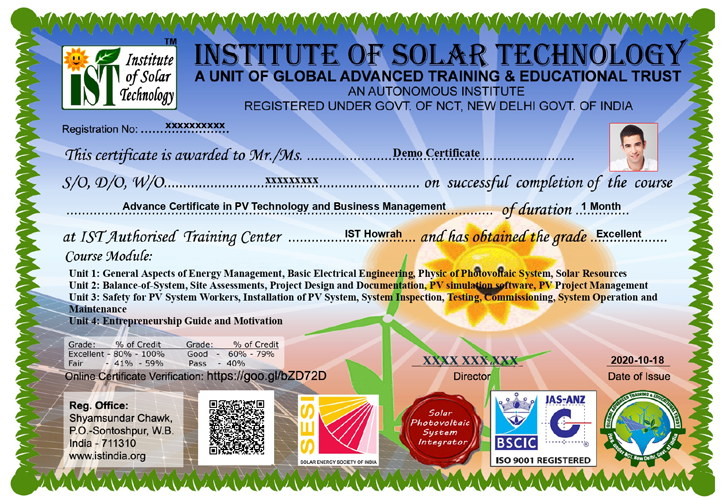Advance Certificate in Photovoltaic System Installer
Advance Certificate in Photovoltaic System Installer
Summary Description: Assemble, install, or maintain solar photovoltaic (PV) systems on roofs or other structures in compliance with site assessment and schematics. May include measuring, cutting, assembling, and bolting structural framing and solar modules. May perform minor electrical work such as current checks.
Job Role
Assessing the installation site job, understanding the principle of PV system, handling installation tools & equipments, understanding functions & process of installation materials, mounting and installing the panels at customer's premises as per design & specification, and ensuring effective functioning of solar energy system after installation.
Certificate will be Awarded by
Institute of Solar Technology, A Unit of Global Advanced Training & Educational Trust, Regd. under NCT New Delhi, Govt. of India
Eligibility
- ITI Pass
- Minimum Educational Qualifications: 10th Pass, ITI Pass
- Minimum age 18 years.
- No UpperAge bar
Medium:
English, Hindi & Local Language
(Book & Online Examination in English)
Duration: 50 Hours within 1 Month
Training Methodology:
The course will be delivered in class room board work, lecture using PowerPoint, sharing of case examples, design exercises, a complete design task and PV System installation facility at institute power plant.
Training Materials:
- FREE printed book as per Syllabus developed by National and International PV Technology Trainer & Expert
- FREE E-Library for future study on up-to-date technology, project guide, National & International FREE Article
- sample bill of materials, sample financial models etc.
- Training & Learning Materials: Wall Chart, Equipment, Measuring Meters, accessories and tools for practical & demonstration only
Core Syllabus:
| Unit | Code | Module Detail | Theory | Practical | Total |
|---|---|---|---|---|---|
| Unit: 1 | GAEM | General Aspects of Energy Management
| 3 | 0 | 3 |
| Unit: 1 | BEE | Basic Electrical Engineering
| 3 | 2 | 5 |
| Unit: 1 | PPS | Physic of Photovoltaic System
| 4 | 4 | 8 |
| Unit: 1 | SRPS | Solar Resources for Photovoltaic System
| 3 | 3 | 6 |
| Unit: 2 | BoS | Solar PV Balance-of-System
| 8 | 2 | 10 |
| Unit: 2 | SAP | Site Assessments and Project Planing
| 2 | 2 | 4 |
| Unit: 3 | SPSW | Safety for PV System Workers
| 4 | 4 | 8 |
| Unit: 3 | IPS | Installation of PV System
| 2 | 8 | 10 |
| Unit: 3 | SIT | System Inspection, Testing, Commissioning
| 6 | 3 | 9 |
| Unit: 3 | SOM | System Operation and Maintenance
| 2 | 1 | 3 |
Knowledge & Skill from this training Program
Through this training session, you can understand your responsibilities at work area
Technical Job skill:
1. Working process to generate solar power2. PV Solar Rooftop and Power Plant Installation
3. Electrical equipments handling & its function
4. Mechanical equipments and its function
5. Site survey and evaluation of various environmental parameters
6. System Installation Process
Civil Work
Mechanical Work
Electrical Work
7. Occupational health and safety process
Professional Skills:
You can able to1. operate/use different tools used in installation work
2. Fill report form, make documentation
3. Communicate with supervisor, coordinator and co-worker
4. work as a team member for achieving quality work/customer satisfaction
5. Understand company's policies and needs
IST prepares skill to handle Job Tasks of an Installer, like
Install photovoltaic (PV) systems in accordance with codes and standards using drawings, schematics, and instructions.Install solar energy systems - Assemble solar modules, panels, or supporting structures, as specified.
Determine appropriate locations for operations or installations - Identify installation locations with proper orientation, area, solar access, or structural integrity for photovoltaic (PV) arrays
Determine materials, equipment, and installation sequences necessary to maximize installation efficiency
Identify methods for laying out, orienting, and mounting modules or arrays to ensure efficient installation, electrical configuration, or system maintenance
Select construction materials - Determine appropriate sizes, ratings, and locations for all system overcurrent protection devices, disconnect devices, grounding equipment, and surge suppression equipment.
Review blueprints or specifications to determine work requirements - Examine designs to determine current requirements for all parts of the photovoltaic (PV) system electrical circuit
Install electrical components, equipment, or systems - Install module array interconnect wiring, implementing measures to disable arrays during installation
Program, adjust, or configure inverters and controls for desired set points and operating modes
Inspect electrical or electronic systems for defects - Check electrical installation for proper wiring, polarity, grounding, or integrity of terminations
Test electrical equipment or systems to ensure proper functioning - Test operating voltages to ensure operation within acceptable limits for power conditioning equipment, such as inverters and controllers
Identify and resolve any deficiencies in photovoltaic (PV) system installation or materials
Test green technology installations to verify performance - Activate photovoltaic (PV) systems to verify system functionality and conformity to performance expectations
Determine connection interfaces for additional subpanels or for connecting photovoltaic (PV) systems with utility services or other power generation sources
Maintain mechanical equipment - Perform routine photovoltaic (PV) system maintenance on modules, arrays, batteries, power conditioning equipment, safety systems, structural systems, weather sealing, or balance of systems equipment
Measure and analyze system performance and operating parameters to assess operating condition of systems or equipment
Demonstrate system functionality and performance, including start-up, shut-down, normal operation, and emergency or bypass operations
Record operational or environmental data - Compile or maintain records of system operation, performance, and maintenance
Course Fee:
Course Fee for Indian Students
Registration Fee: Rs.5,999/-
Training Fee : Rs. 13,999/-
Total Course Fee: Rs. 19,998/ including Service Tax & examination fee.
Pay Total Course Fee at the time of Registration/admission.
Course Fee for International Students
Registration Fee: $ 170 (US Dollar)
Training Fee : $ 410 (US Dollar)
Total Course Fee: $ 580 (US Dollar) including Service Tax & examination fee.
Pay Total Course Fee at the time of Registration/admission.
Become PV Solar Expert with Verified Skill Certification

1. An Autonomous Institute registered under NCT, Govt. of India under Indian Trust Act.
2. Registered Under NGO-DARPAN, NITI Aayog Govt. of India
3. ISO 9001:2015 registered Educational Trust
4. Certificate can APOSTILLE from Ministry of External Affairs, Govt. of India to get job abroad India.
5. Organisational Member of Solar Energy Society of India, (the Indian Section of the International Solar Energy Society (ISES))
6. Institute of Solar Technology Registered under Intellectual Property India, Govt. of India
7. Registered under 80G and 12A and CSR Act, Govt. of India
8. Fully organised Practical and Research Lab at GATE Trust Howrah, West Bengal
9. GATE Research - Research unit of Global Advanced Training and Educational Trust. You can Write & Publish a Review/Research paper,
Offline classroom class Jul - 2025 at Howrah (Kolkata), West Bengal
Quick Inquiry Form
IST Prestigious Alumni Feedback
IST alumni have achieved significant success, gained recognition, or made notable contributions in PV Solar and Renewable energy areas.

Good platform for Basics to Technically in-depth Knowledge of Solar. Received good knowledge in solar system, good explanation, clearing the concepts.
- Tousif S. Shah,Sales And Service Specialist at ACZET INSTRUMENT LLC, DUBAI.
Profile: https://www.linkedin.com/in/tousif-s-shah-5482b0116/details/education/

Detailed explanations of calculations and proper details of the installations session was helpful. Good Course.
- Juhi Marwadi,Rajkot, Gujarat, India
Marketing, PIXON ENERGY LIMITED
Profile: https://www.linkedin.com/in/juhi-marwadi-205524115/

I thank Mr Roy for being a generous , calm & knowledgeable Trainer .The calmness & to explain any concept in the easiest way possible. The course module is structured in a way that it covers almost all the aspects of Solar PV Design including technical & financial models. I wish IST all success & acknowledge their contribution in spreading deep learning & raising skills bars of Professionals/ Individuals in Renewable sector
- PAWAN NATHANI,GREATER NOIDA, INDIA
POWERCHINA, DUBAI (Sr. Electrical Design Engineer)
Profile: https://www.linkedin.com/in/pawan-nathani-69ab7213

Great platform for learning about the solar industry. Detailed working knowledge and hands-on technical training.
- Amit Bhandari,Mumbai, Maharashtra, India
Director at AVA2 Green Solutions
Profile: https://www.linkedin.com/in/amitbhandari2103/details/certifications/

The best institute for engineers and startups. From technical to commercial up-to-date knowledge gaining platform. I have completed my solar excelent training at IST in 2014
- Bibhudatta Mishra,Engineer Engineer Lanco Solar Pvt.Ltd, PV Module Plant
Profile: https://www.linkedin.com/in/bibhudatta-mishra-0958b056/ FaceBook Page: Odisha
More Related Course

Add EV Products (Free Listing)
EVSEMart is an Electric Vehicle equipment directory that B2B and B2C companies can use. Customers can search for suppliers, distributors, manufacturers, vendors in Electric Vehicle industries. customers can quickly find what they want and get the sales process going.


















